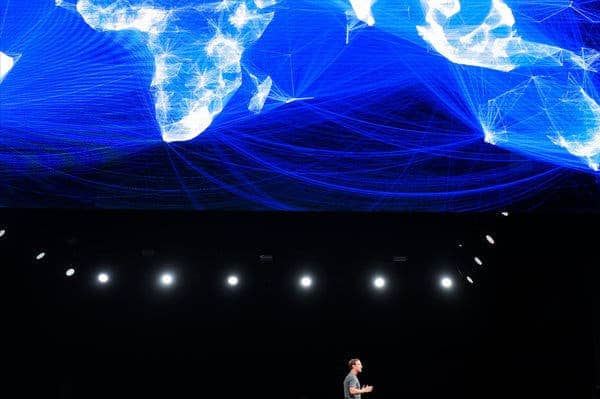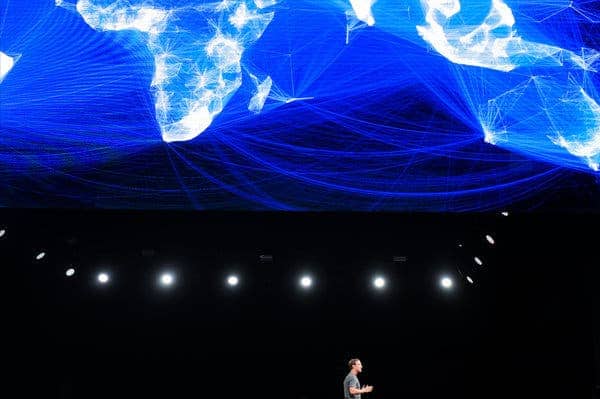
” The future is private “, Mark Zuckerberg announced at the opening of the Facebook developer conference F8, and the applause was muted. He could not inspire this audience for his new company motto. Facebook’s CEO even had to tell the programmers who develop apps for his ecosystem from Facebook, Messenger, WhatsApp and Instagram that their work could become more difficult in the future: “We have made some changes to our developer program in the past week, the further limit access to our data. “

It is a reaction to the most challenging year in the history of the social network. A year in which third parties with or without Facebook’s knowledge had sucked the personal information of millions of users from the social network. In which hundreds of millions of customer passwords were suddenly unencrypted, and email contacts were readout. A year in which demands on both sides of the Atlantic became louder that Facebook had to be regulated, not to say: smashed.
Zuckerberg mentioned all these errors in his keynote, if only between the lines. “I know that we don’t have the best reputation for protecting privacy, to say the least,” he said with a nervous laugh, “but I am determined to do it right and open a new chapter for our products. ” In this case, he would even like to break with the Silicon Valley principle of merely trying out innovations and tackling problems if they arise during operation. “We take at least a year to consult with experts, law enforcement officers and governments around the world on how to install the right security systems in an encrypted system.”
Communication should take place more in private groups
A real innovation in terms of data protection: Facebook introduced the so-called end-to-end encryption as standard in its messenger, as it did three years ago with its sister service WhatsApp. So far, it was only an option that had to be selected explicitly. With this type of encryption, only the sender and the recipient can read the content of a message – no hacker, no secret eavesdropping service, but also not the operator of the service. As a result, Facebook cannot use the content to add data to the individual profiles of its users, which it rents to advertisers.
However, these encrypted private messages are only one element in the reorientation from the public to private. “In addition to the digital public space, we also need a digital equivalent to the living room,” said Zuckerberg. Instead of the news feed, he wants to give Facebook groups, in which people exchange information, more visibility. In Facebook’s advertising videos, these are groups of friends and families, amateur anglers and fans of vegan cheese, who chat there about their particular topic. It always sounds fluffy, cozy and homely. But the digital living room can of course also be the musty back room, in which questionable political groups cluster together.
At every turn, Facebook users should be offered such groups in the future, of course also in the hope that they will spend a lot of time in them and look at a lot of advertising accordingly. Even the design of the website is to be changed for the first time in five years. “It’s not even blue,” joked Zuckerberg, as if the problems had disappeared.
Zuckerberg did not respond to the criticism of Facebook’s business model, which has grown louder over the past year. It continues to bring reliable profits to the company. In the first three months of last year, ad revenue increased approximately a quarter over the previous year to $ 15 billion – making it easy for the company to put up three to five billion as a precautionary measure for any punitive payments to the US government. Such punishments for misappropriating data are “a slap on the hand,” commented the New York Times. On the day Facebook announced the existence of this postage account, the company’s market value increased by $ 40 billion.
Does Facebook want to “eat the internet”?

Zuckerberg emphasized several times that his privacy offensive is about more than a few new features. “This will change the way we run our company,” he said. Now the experts can guess what he means. For example, the management structure of Facebook? It is currently relatively clear: Zuckerberg holds enough shares to make decisions alone. Beside him, only the managing director Sheryl Sandberg has something to say. “If you wanted to draw an organization chart of Facebook, it would look like a large loaf of bread with a huge antenna sticking out of it,” writes early Facebook investor and recently Facebook critic Roger McNamee in his book Zucked , published in spring .“Zuck and Sheryl are sitting on the top of this antenna. Everyone else is in the bread.”
Or does the change that Zuckerberg speaks of relating to how you make money? If users move away from the Facebook platform to the messaging services, the company has to look for new sources of income. Advertising has so far not worked in these services – WhatsApp is accessible worldwide but does not generate any significant sales.
Industry expert John Battelle, the founder of the Wired digital magazine, speculated about this in March, what Zuckerberg could be up to with his panning for privacy. His analysis: Facebook wants to “eat the Internet”. The ecosystem of Facebook apps should increasingly be identical to the Internet for people. A fenced garden that you no longer have to leave and in which you not only communicate but also do business, including payment. Battelle sees the role model in the Chinese Tencent group, which has converted its WeChat platform into a “revenue geyser” in which advertising only plays a subordinate role. WeChat is, of course, under the supervision of the Chinese surveillance state, which uses it to follow its citizens every step of the way and evaluate their behaviour. Maybe Facebook is aiming for a data-protected version of this network on the net?
Messenger, WhatsApp and Instagram should communicate with each other

In his keynote yesterday, Mark Zuckerberg formulated six principles that should underlie his new Facebook. In addition to privacy, encryption and data protection, the term “interoperability” also appears there. This means that different apps should work better together in the future. There are historical reasons why the users of the empire can communicate via three messaging apps (Messenger, WhatsApp and Instagram Direct), two of which come from acquired companies. In the future, it should be possible to send messages back and forth between the services – the first step towards a merger with a super messenger, which the American antitrust authority will undoubtedly be watching closely.
When Mark Zuckerberg talks about his plans, he still looks like the inexperienced college student who just tried something out in 2004. One does not know whether one should take away the naivety from him or whether there is a devilish master plan behind the rather diffuse statements. In an interview with the Washington Post on the eve of the F8 conference, he answered “don’t know” to five probing questions. But he is confident that everything will be fine.
Mark Zuckerberg has asked the world once again to believe that he has learned from his mistakes finally. But the commitment to privacy is initially just a commitment. The approximately 5,000 developers in the hall in San José cheered him in the end – when he announced that each of them was given one of the new Oculus Quest smart glasses (unit price: 449 euros).
